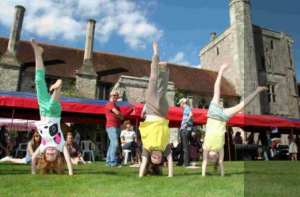The verges of the roads are awash with them in early summer, not wild flowers but notice boards, lovingly painted by hand or fashionably designed, promoting the village fete.
 It feels as though every village in the county of Hampshire is galvanized into action. Its time for the village fete. The village greens are prepared, bunting pulled out of attics, tea urns dusted off and all the old favourite stalls given a new lease of life. Who runs what stall and what happened to the coconut shy? The committee pulls itself together in the depths of winter, anticipating a warm balmy summer’s day for all to enjoy.
It feels as though every village in the county of Hampshire is galvanized into action. Its time for the village fete. The village greens are prepared, bunting pulled out of attics, tea urns dusted off and all the old favourite stalls given a new lease of life. Who runs what stall and what happened to the coconut shy? The committee pulls itself together in the depths of winter, anticipating a warm balmy summer’s day for all to enjoy.
So what is the history of the summer fete? The word fete is borrowed from the French and means holiday. Historically, towns were granted charters to hold fairs, maybe once or twice a year and lasting several days or weeks. These fairs acted as markets for selling goods and services, the great sheep fairs at Weyhill and St Giles in Winchester are examples. They were also fairs for the selling and hiring of services and wherever there are crowds, others saw an opportunity to make money, sidestalls offering trinkets, puppet shows, sword swallowers, pie and sweet stalls, games of skill and luck. You name it, the fair provided it. Attending the fair was like going on holiday.
The tradition of the village fetes quite possibly grew out of the larger fairs. They are a day of fun and laughter in the community, a day when little work is done and all come together to ‘holiday’. There were few opportunities to have a day for fun. The timing of the fete revolves around the agricultural timetable. By early summer the soil has been prepared after winter and the crops are in but harvest is a little way off. Perfect timing for a day off. There was little money or opportunity for a day away from work and the fairs and fetes were gleefully awaited. Servants in the large houses were allowed time to attend, it was a day when everyone could relax and have fun.
The fetes seem to have originated in the mid to late C19th. The hospital of St Cross in Winchester is thought to be one of the oldest in Hampshire, established 120 years ago. The open spaces in villages, the greens and glebe fields, are the focal point of the activities but in many cases streets are closed and doors flung open to welcome visitors to the village fete. Its a time to show off the community, flowers are arranged in the church, flowerbeds spruced up and the bunting hung from building to tree and back again. The village school practices the maypole dance, dogs are groomed for the most testing competition of the day and the tombola wheel is cranked. The big attraction is who will open the fete? Celebrities travel far and wide to cut the ribbons of hundreds of fete openings. Pubs and ice cream sellers do a roaring trade and much fun is had by all.
By the end of July, most fetes will have come and gone, harvest is on its way, the village fete is heaved back into attic spaces and sheds and preparations start over for next years event. Local newspapers fill with pictures and the coffers of local charities are replenished. Long may the village fete continue.

